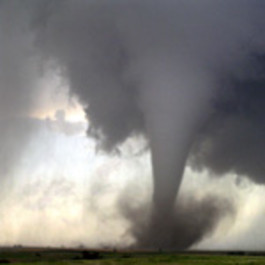The Tornado

The tornados that swept through, to the south of us a few days ago, leaving vast swaths of devastation and death, also left behind a collection of stories for the ages. Like the one about Latonya Stevens who heard the thunder and lightning in the distance, ran for her four children, but mysteriously passed out—and when she came to, the roof was gone, and so were three of her children—who were found up to a hundred feet away, with only cuts and bruises and a story to tell for the rest of their lives! Not so fortunate another young mother, Stephanie Decker, who was at home with her two children when the deadly twister struck their three-story brick house in Marysville, Indiana. Her husband, a high school math teacher, had been texting her to get the children into the basement. She texted back that the whole house was shaking. And then no further messages. Turns out Stephanie had spotted the tornado moving across their acreage toward the house, had tied both children to her and each other with a blanket and then instinctively threw herself on top of the children as the tornado exploded into their home. When the mayhem passed, the house was collapsed. The young mother was pinned, her legs crushed by the fallen debris. Neighbors called for help, a deputy sheriff applied tourniquets, she was rushed to a local hospital, then airlifted to the University of Louisville hospital, where it was determined she had lost both legs, one above the knee and the other above the ankle. And the children? Unscathed. Saved by their mother’s sacrificial action. Said her husband, “‘I told her, “They’re here because of you.’” (South Bend Tribune 3-6-12) Which, as it turns out, is true of all of us, isn’t it? We’re here because of the sacrificial action of One who threw His body over us, “who loved [us] and gave Himself for [us]” (Galatians 2:20). We’re here because of Calvary, where Christ Jesus lost more than His legs in saving this world. But the tornado? The ancient narrative of Job describes how the adversary of the human race (ha satan) harnesses the fury of the wind to destroy human possessions, human life—“and suddenly a great wind came” (Job 1:18, 19). The great winds of a tornado offer precious little time for preparation—sometimes only split seconds. Moments earlier life was copasetic—and then suddenly the world is upside down. The point, like a tornado, is inescapable. Those who survive the fury of the wind are the ones who monitor the signs, who in a time of storm maintain heightened alert, who have in place emergency preparations for the eventuality. Through ancient Ezekiel God issues this fourth watch alert: “Thus says the Lord GOD: ‘A disaster, a singular disaster; behold, it has come! An end has come, the end has come; it has dawned for you; behold, it has come!’” (Ezekiel 7:5, 6). Like a tornado! Which, of course, is the other point. Because “like a tornado” means you never really know. If you live in Tornado Alley (as all of earth’s inhabitants now do), you must live in prepared expectancy. To live unprepared is to spurn the gift of the One who lost more than His legs to save us from the impending storm.